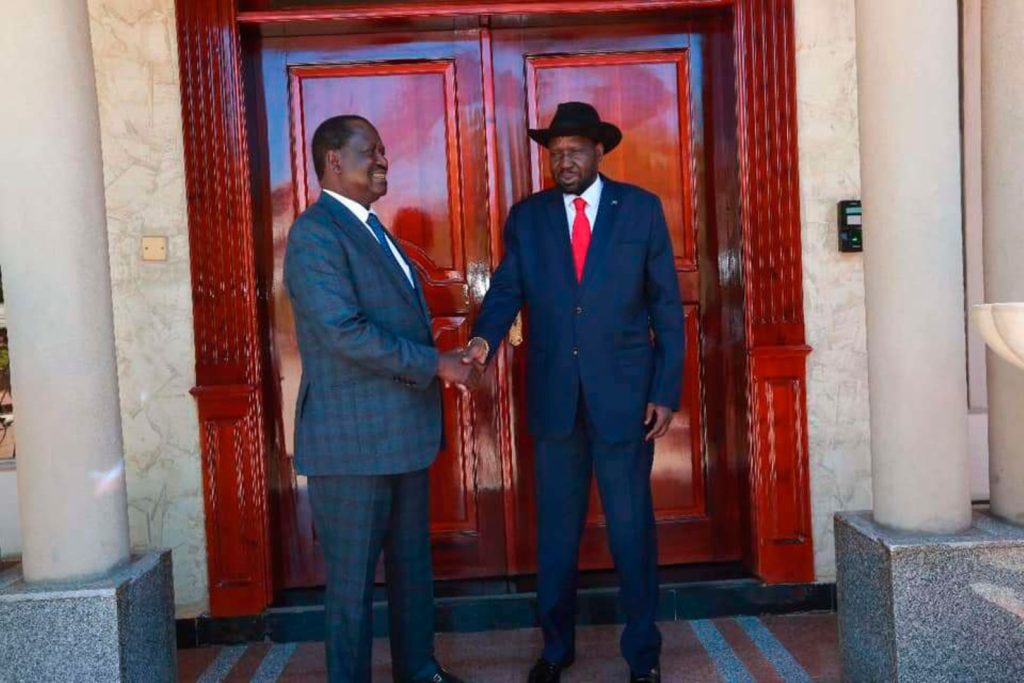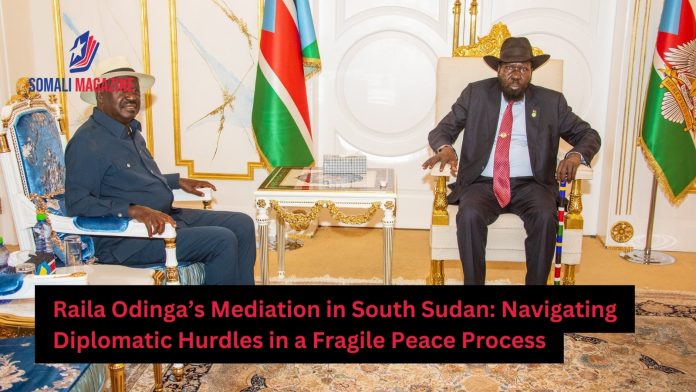Facebook Twitter Instagram Somali Magazine - People's Magazine
Kenya’s Special Envoy Raila Odinga encountered significant challenges during his recent mediation efforts in South Sudan, highlighting the complexities of resolving the country’s escalating political crisis. Odinga, appointed by Kenyan President William Ruto to facilitate dialogue between South Sudanese President Salva Kiir and First Vice President Riek Machar, faced diplomatic setbacks that have raised questions about the effectiveness of regional peace initiatives.
Odinga’s mission began on March 28, 2025, when he traveled to Juba to meet with President Kiir and Vice President Machar. However, upon arrival, Odinga was denied access to Machar, who had been placed under house arrest following clashes between government forces and the White Army militia in Nasir, Upper Nile State. The South Sudanese government cited ongoing investigations into the violence, which resulted in the death of General Majur Dak and several others, as the reason for Machar’s detention.
President Kiir reportedly directed Odinga to consult with Ugandan President Yoweri Museveni before engaging further in the mediation process. This move sparked controversy, with South Sudanese officials denying that Kiir had instructed Odinga to meet Museveni. Instead, they claimed the trip to Uganda was prearranged and not linked to Kiir’s directives. The diplomatic row deepened when Odinga publicly stated that he was denied access to Machar, prompting South Sudanese officials to refute his claims and accuse him of misrepresenting diplomatic norms.
The challenges faced by Odinga underscore the fragile nature of South Sudan’s political landscape. The country has been grappling with instability since its independence in 2011, with the 2018 Revitalized Peace Agreement failing to fully resolve tensions between Kiir and Machar. The recent clashes in Nasir have further strained relations, raising concerns about the durability of the peace agreement and the risk of renewed civil war.
Odinga’s mediation efforts were complicated by the lack of trust between the conflicting parties and the broader regional dynamics. South Sudan’s opposition has accused Kiir’s administration of undermining the peace agreement by detaining Machar and other SPLM-IO officials. Meanwhile, Kiir’s government has defended its actions, citing security concerns and the need to investigate the violence in Nasir.

The African Union Commission (AUC) has stepped in to support mediation efforts, dispatching a high-level delegation to Juba to engage with stakeholders and promote dialogue. AUC Chairperson Mahmoud Youssouf Ali emphasized the importance of upholding the provisions of the Revitalized Peace Agreement and called for all parties to commit to de-escalating tensions. The AU’s involvement reflects the urgency of addressing the crisis and preventing further instability in South Sudan.
Odinga’s role as Kenya’s Special Envoy has also drawn scrutiny, with critics questioning whether his appointment was politically motivated. As a former Prime Minister and seasoned diplomat, Odinga brings valuable experience to the mediation process. However, the challenges he faced in South Sudan highlight the limitations of individual efforts in resolving deeply entrenched conflicts.
The diplomatic hurdles encountered by Odinga have sparked broader discussions about the effectiveness of regional peace initiatives. Analysts have emphasized the need for coordinated efforts involving multiple stakeholders, including the AU, IGAD, and the United Nations, to address the root causes of South Sudan’s instability. Strengthening governance, promoting economic development, and fostering reconciliation are seen as critical steps toward achieving lasting peace.
As South Sudan navigates this turbulent period, the focus remains on finding sustainable solutions to its political and security challenges. Odinga’s mediation efforts, despite their setbacks, serve as a reminder of the complexities of conflict resolution and the importance of regional collaboration in promoting peace.

